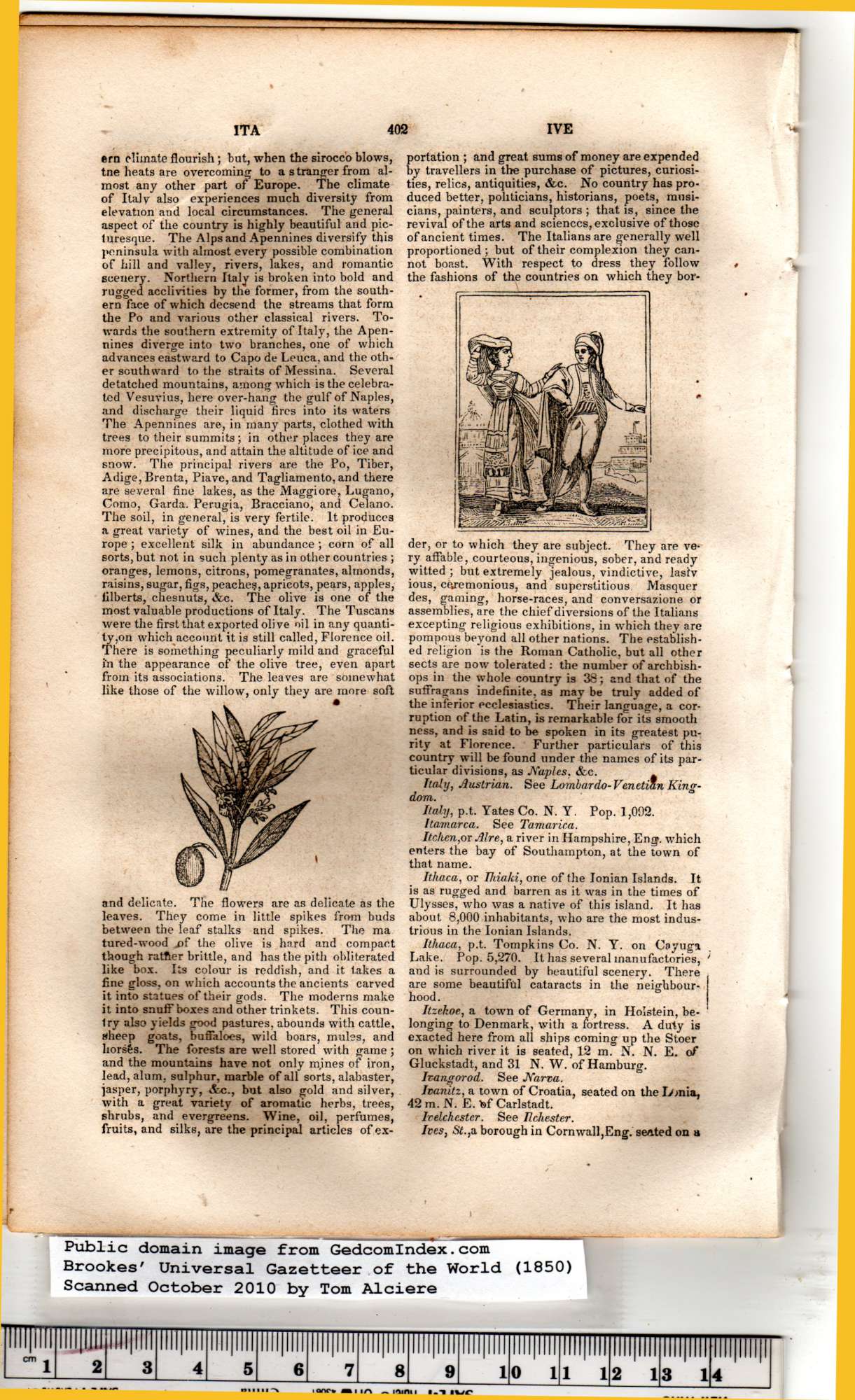|
ern climate flourish; but, when the sirocco blows,
tne heats are overcoming to a s tranger from al-
most any other part of Europe. The climate
of Italv also experiences much diversity from
elevation and local circumstances. The general
aspect of the country is highly beautiful and pic-
turesque. The Alps and Apennines diversify this
peninsula with almost every possible combination
of hill and valley, rivers, lakes, and romantic
scenery. Northern Italy is broken into bold and
rugged acclivities by the former, from the south-
ern face of which decsend the streams that form
the Po and various other classical rivers. To-
wards the southern extremity of Italy, the Apen-
nines diverge into two branches, one of which
advances eastward to Capo de Leuca, and the oth-
er southward to the straits of Messina. Several
detatched mountains, among which is the celebra-
ted Vesuvius, here over-hang the gulf of Naples,
and discharge their liquid fires into its waters
The Apennines are, in many parts, clothed with
trees to their summits; in other places they are
more precipitous, and attain the altitude of ice and
snow. The principal rivers are the Po, Tiber,
Adige, Brenta, Piave, and Tagliamento, and there
are several fine lakes, as the Maggiore, Lugano,
Como, Garda. Perugia, Bracciano, and Celano.
The soil, in general, is very fertile. It produces
a great variety of wines, and the best oil in Eu-
rope ; excellent silk in abundance ; corn of all
sorts, but not in such plenty as in other countries ;
oranges, lemons, citrons, pomegranates, almonds,
raisins, sugar, figs, peaches, apricots, pears, apples,
filberts, chesnuts, &c. The olive is one of the
most valuable productions of Italy. The Tuscans
were the first that exported olive oil in any quanti-
ty,on which account it is still called, Florence oik
There is something peculiarly mild and graceful
i'n the appearance of the olive tree, even apart
from its associations. The leaves are somewhat
like those of the willow, only they are more soft
and delicate. The flowers are as delicate as the
leaves. They come in little spikes from buds
between the leaf stalks and spikes. The ma
tured-wood x>f the olive is hard and compact
though rather brittle, and has the pith obliterated
like box. Its colour is reddish, and it takes a
fine gloss, on which accounts the ancients carved
it info statues of their gods. The moderns make
it into snuffboxes and other trinkets. This coun-
Iry also yields good pastures, abounds with cattle,
Sheep goats, buffaloes, wild boars, mules, and
horsts. The forests are well stored with game ;
and the mountains have not only m.ines of iron,
lead, alum, sulphur, marble of all sorts, alabaster,
jasper, porphyry, Ac., but also gold and silver,
with a great variety of aromatic herbs, trees,
shrubs, and evergreens. Wine, oil, perfumes,
fruits, and silks, are the principal articles of ex-
portation ; and great sums of money are expended
by travellers in the purchase of pictures, curiosi-
ties, relics, antiquities, &c. No country has pro-
duced better, politicians, historians, poets, musi-
cians, painters, and sculptors ; that is, since the
revival ofthe arts and sciences, exclusive of those
of ancient times. The Italians are generally well
proportioned ; but of their complexion they can-
not boast. With respect to dress they follow
the fashions of the countries on which they bor-
|
der, or to which they are subject. They are ve-
ry affable, courteous, ingenious, sober, and ready
witted ; but extremely jealous, vindictive, lasiv
ious, ceremonious, and superstitious. Masquer
des, gaming, horse-races, and conversazione or
assemblies, are the chief diversions of the Italians
excepting religious exhibitions, in which they are
pompous beyond all other nations. The establish-
ed religion is the Roman Catholic, but all other
sects are now tolerated : the number of archbish-
ops in the whole country is 38; and that of the
suffragans indefinite, as may be truly added of
the inferior ecclesiastics. Their language, a cor-
ruption of the Latin, is remarkable for its smooth
ness, and is said to be spoken in its greatest pu-
rity at Florence. Further particulars of this
country will be found under the names of its par-
ticular divisions, as Naples, &c. .
Italy, Austrian. See Lombardo-Venetian King-
dom.
Italy, ph. Yates Co. N. Y. Pop. 1,092.
Itamarea. See Tamariea.
Itchen,or Aire, a river in Hampshire, Eng. which
enters the bay of Southampton, at the town of
that name.
Ithaca, or Ihiaki, one of the Ionian Islands. It
is as rugged and barren as it was in the times of
Ulysses, who was a native of this island. It has
about 8,000 inhabitants, who are the most indus-
trious in the Ionian Islands.
Ithaca, ph. Tompkins Co. N. Y. on Cayuga
Lake. Pop. 5,270. It has several manufactories,
and is surrounded by beautiful scenery. There
are some beautiful cataracts in the neighbour-
hood.
Itzehoe, a town of Germany, in Holstein, be-
longing to Denmark, with a fortress. A duty is
exacted here from all ships coming up the Stoer
on which river it is seated, 12 m. N. N. E. of
Gluckstadt, and 31 N. W. of Hamburg.
Ivangorod. See Narva.
Ivanitz, a town of Croatia, seated on the Lonia,
42 m. N. E. bf Carlstadt.
Irelchester. See Ilchester.
Ives, St.,a borough in Cornwall,Eng. seated on a | |
